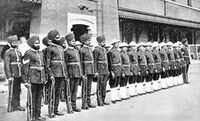Daiwu
The Daiwu (Korukkan: 戴雾, literally: "to wear smoke" or "obscuring") were the secret police that served the CEO of The West Pahadan Railway Company. The police were founded by Zhang Xieren in 1914, two years into his control of the company, following an incident that saw him almost assassinated by the Daughters of Asphotachal. Whilst originally envisioned by Zhang as a personal bodyguard that reported directly to him, his desire for retribution saw their powers expanded by numerous Directives in the months following their establishment. By January of 1915 the had the authority to stop and search, investigate property without a warrant, overrule the judiciaries of local communities (and eventually the client states of the company), had the permission to command local law enforcement agencies for assistance in their endeavors and had license to kill 'terrorists, rebels and insurrectionists'. By the time of the Western War, the Daiwu had an extensive intelligence agency component and were instrumental tools of counterintelligence, espionage and reconnaissance.
The Daiwu were adorned from head to toe in armour fashioned to look like traditional sets of armour from Shihoki. This armour was not only highly effective against small arms fire but its mechanical components and fuel source allowed the Daiwu to increase their own physical strength and endurance. The numerous smoke vents gave them their name 'Daiwu'.
Whilst officially disbanded by the succeeding West Pahadan Repbulic in 1949, their legacy played an important role in the development of police forces in both it and the Imperial Federation. Countless Daiwu agents 'retired' in the Imperial Federation and assisted then-Chancellor Zhang Xieren with instituting his democratic overhaul, arresting numerous 'anti-democracy' and 'anti-republican' individuals.
Creation
The origins of the Daiwu can be traced to as early as 1909, when Zhang Xieren was Grand Commandant of the Great Undertaking in Tungnir. Having worked with numerous of the Empire's Censors during the project, Zhang became enamoured with their status, responsibility and effectiveness. The Grand Commandant tried numerous times to draft up a personal body-guard to mirror the work of the Censors in a more personal level. When Zhang became Chief Executive Officer of West Pahadan Rail, he once again entertained this plan. Whilst originally creating a security detail composed of native Korrukans and -- on occasion -- native 'pacified' Pahadans -- they proved wholly ineffective as to the grander ambitions and aspirations expected of them.
The inability of these guardsmen (mainly attributed to the fact it wasn't their purpose) in detecting the Summer Orchid Plot by the Daughters of Asphotachal ultimately led to their downfall and replacement. On August 2nd, 1914, whilst he was travelling from Nakashigawa to the Xiàjì Lánhuā complex, a summer resort and retreat built by WPR for its upper management, an explosion on the line caused the train to de-rail and kill 18 passengers. Zhang Xieren was ultimately unscathed by the attempt on his life but quickly left the scene back to Nakashigawa.
By August 7th Zhang had issued a Directive that authorised the creation of the 'Daiwu', a conceptual name at first that stuck and became their official title. Whilst originally intended to be a higher caliber of body-guard, their metamorphasis into a secret police force was achieved between September of 1914 and January of 1915. Their powers were extensively expanded gradually by Zhang, to whom they answered directly, until their original duties were removed and replaced.
Authorities, duties and responsibilities
The Directive that established the Daiwu outlined their initial responsibilities as nothing more than "defence of the Chief Executive Officer by any means necessary." However, even within days of their official recruitment, Zhang Xieren was already interested in a greater expansion and specification of their intended roles. Most of their increase in power happened meteorically throughout the months between September of 1914 and January of 1915.
By January of 1915 their official list of powers, granted through no less than 9 Directives, granted the Daiwu: powers of arrest, the ability to stop and search any civilian, the permission to investigate property without an official warrant, the capability to direct, command and utilise local police forces as aides in their own investigations, the permission to openly carry weapons, the legal right to commandeer civilian vehicles with no promise of compensation, access to Imperial military checkpoints, and -- most infamously -- Directives 413: the "licence to kill terrorists, rebels and insurrectionists" and 417: the "authority to overrule incorrect assessments by local judicial courts in both WPR and her client states."
After a period of relative stability in their permissions, by the mid 1920s Zhang once again expanded their powers in the event of a potential war with further states in Pahada and even Pavlostani. Daiwu were trained in arts of subterfuge, infiltration and the creation of spy-cells. By 1930 the Daiwu boasted an incredibly impressive intelligence agency both within WPR and neighbouring nations. Thousands of agents would go on to have a direct role in the Western War, where the Daiwu's Intelligence Branch performed extensively in fields of espionage and reconnaissance.
Daiwu were permitted to conduct business in any manner they pleased; either covertly or overtly. Those who acted overtly were expected to be treated with honour, friendship and hospitality by the native population. Assaulting a member of the Daiwu was a treasonous offence and was punished with death and acquisition of familial property. Daiwu were known to declare themselves as 'sheriff' of rural communities and would often act with impunity.
Organisation
| Zhang Xieren | |||||||||||||||||||||||
| Daiwu Internal | Daiwu External | ||||||||||||||||||||||

